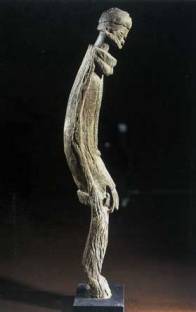Homophobic stereotypes describe gays and lesbians as solitary, isolated and lonely. Indeed, queer identity is achieved by the lonely undertaking of a mythic journey beneath the surface of things. We go down into the dark, deep immensity of the Underworld. We follow the yellow brick road to the Emerald City.[1] Like Orpheus, we create unearthly music. Like Dorothy, we will make irreplaceable friends. We are bound to meet death, and our own fear of death, as we subvert the inevitability of breeding. We wrestle with the bad witch, cajole the ineffectual wizard, and contest the Underworld for our beloved. We integrate despised and fearful aspects of female power and male vulnerability. We encounter our own failure. We face self-doubt and find, to our great surprise, we already have the courage, heart and brains that we’ve been seeking. Finally we click our red heels together, and say “There’s no place like home.”

One of the Nommo, androgynous water spirit and mythic ancestor of the Dogon people, Africa
Home is homosexuality – an underground reservoir of cool, sweet water. Queer answers the heart’s deep yearnings for place and identity. To reach this home one must travel alone, beneath norms, expectations and established forms of relationship. Once we drink there, we are irrevocably changed. Homosexuality sets us apart from whatever other communities, religious affiliations, class, race and family alliances claim us. The queer community gives us a name and a home, though it scarcely exists. No institutions support it; no place defines it; no spokesperson can represent it. The community is “an ephemeral, woven network of belonging”[2] that depends on our participation. Orientation continually weaves both self and community.
Shadow: Carol Warren writes, “The gay world, because it is stigmatized and set apart, is one that demands total identification. Thus a person who affiliates with the community and accepts gay identity possesses a rarity in contemporary life: a total and all-encompassing core of existence by which to answer the question Who am I?”[3] And yet the question, “Who am I?” is perhaps best navigated through its unanswerableness. Queer precludes the closure and limitations implied by fixed notions of identity. Our orientation can stay open and fluid, slippery and wild.
Related Figures and Attributes: Hero, Abnormal
For more writing on this symbol, see these chapters of Orientation: Mapping Queer Meanings: The Aquifer, Fluidity, The River, Introduction.
[1] Robert Hopke in conversation with Mark Thompson, 1994 explores The Wizard of Oz as a gay myth.
[2] Aaron Betsky, 1997, (265).
[3] Carol Warren, 1974, (145) or (162)


